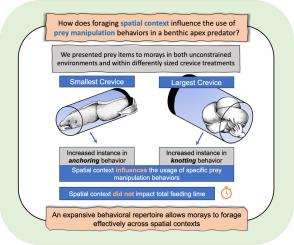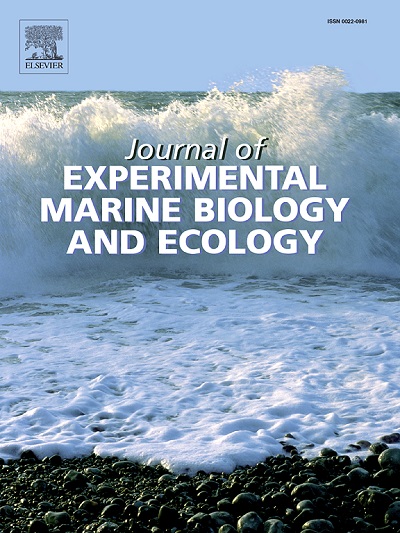空间环境对加州海鳗(Gymnothorax mordax)操纵猎物行为的影响
IF 1.8
3区 生物学
Q3 ECOLOGY
Journal of Experimental Marine Biology and Ecology
Pub Date : 2024-11-07
DOI:10.1016/j.jembe.2024.152067
引用次数: 0
摘要
捕食策略受多种因素影响,如猎物类型、猎物密度和/或非生物条件。然而,有关空间限制对捕获后行为的作用的研究却很有限。我们的目的是评估空间环境对加州海鳗(Gymnothorax mordax)捕食猎物行为的影响。我们首先比较了 "封闭 "和 "开放 "觅食环境中特定操作行为的持续时间,然后比较了与海鳗个体直径相当的紧密封闭空间。我们观察到,参与特定操作行为的时间因空间环境而异。尽管有这些变化,但总的进食时间(包括操纵和吞食猎物)在不同的处理中并没有变化。这些结果凸显了海鳗行为的灵活性,表明它们可以根据特定的空间环境调整操纵猎物的策略,而不会影响总体的摄食时间。此外,我们还记录了两种以前未曾描述过的行为(尾部锚定和身体锚定),当由于空间限制而无法进行打结行为时,这两种行为似乎被用于最狭窄的处理中,以发挥杠杆作用。这项研究为我们深入了解这种当地大量存在的顶级掠食者的觅食生态提供了宝贵的资料,并有助于我们进一步了解海藻森林生态系统底栖生物群落中掠食者与猎物之间的相互作用。本文章由计算机程序翻译,如有差异,请以英文原文为准。

The influence of spatial context on prey manipulation behaviors in the California moray eel (Gymnothorax mordax)
Predation strategies are shaped by multiple factors, such as prey type, prey density, and/or abiotic conditions. However, limited research has investigated the role of spatial constraints on post-capture behaviors. Our aim was to assess the impact of spatial context on prey manipulation in the California moray eel (Gymnothorax mordax), a crevice forager with a diverse prey handling repertoire. We first compared the duration engaged in specific manipulation behaviors between spatially “enclosed” and “open” foraging environments, followed by a comparison of tightly enclosed spaces that were scaled to individual moray diameter. We observed that the durations spent engaged in specific manipulation behaviors varied based on spatial context. Despite these changes, total feeding time, which consists of both manipulating and swallowing prey, did not vary across treatments. These results highlight the behavioral flexibility of morays, suggesting that they can adjust prey manipulation strategies for specific spatial contexts without compromising overall feeding duration. We additionally documented two previously undescribed behaviors (tail and body anchoring) which seem to be used in the narrowest treatments for leverage when knotting behavior was not possible due to spatial constraints. This research provides valuable insight into the foraging ecology of this locally abundant apex predator and aids in furthering our understanding of predator-prey interactions in the benthic community within the kelp forest ecosystem.
求助全文
通过发布文献求助,成功后即可免费获取论文全文。
去求助
来源期刊
CiteScore
4.30
自引率
0.00%
发文量
98
审稿时长
14 weeks
期刊介绍:
The Journal of Experimental Marine Biology and Ecology provides a forum for experimental ecological research on marine organisms in relation to their environment. Topic areas include studies that focus on biochemistry, physiology, behavior, genetics, and ecological theory. The main emphasis of the Journal lies in hypothesis driven experimental work, both from the laboratory and the field. Natural experiments or descriptive studies that elucidate fundamental ecological processes are welcome. Submissions should have a broad ecological framework beyond the specific study organism or geographic region.
Short communications that highlight emerging issues and exciting discoveries within five printed pages will receive a rapid turnaround. Papers describing important new analytical, computational, experimental and theoretical techniques and methods are encouraged and will be highlighted as Methodological Advances. We welcome proposals for Review Papers synthesizing a specific field within marine ecology. Finally, the journal aims to publish Special Issues at regular intervals synthesizing a particular field of marine science. All printed papers undergo a peer review process before being accepted and will receive a first decision within three months.

 求助内容:
求助内容: 应助结果提醒方式:
应助结果提醒方式:


